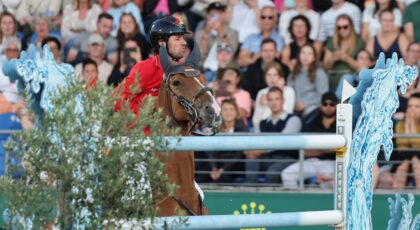When Debbie Cruz imported her 2012 Friesian from Europe, she was excited to welcome the gelding into her life.
However, the mount she purchased as a gelding from The Netherlands still had a lot of stallion left in him. Literally.
Marquis, Cruz’s hopeful dressage mount, arrived safe and sound to her home in Miami, FL, in early 2020. When he started to display quintessential stallion-like behavior, she called her veterinarian, Dr. Joseph Zerilli, to help her determine the cause of this very “un-gelding like” behavior.
“I was told that he had been gelded while in The Netherlands, but when he came home, he was acting exactly like a stud rather than the sweet gelding I thought would be arriving,” said Cruz. “I wasn’t sure what the cause could have been, but I knew something wasn’t right.”
Dr. Zerilli performed a blood test as part of his exam, which revealed very high levels of testosterone for a horse that was supposed to be a gelding. The level of testosterone present was a solid marker for a retained testis, one that would require surgery to remove. Marquis was referred to Dr. Weston Davis, a board-certified surgeon at Palm Beach Equine Clinic in Wellington, FL.
Dr. Davis used a hCG stimulation test and abdominal ultrasound to determine if testicular tissue was present and the source of Marquis’ testosterone levels were confirmed: he was a cryptorchid. Also known as a “rig” or “ridgling,” a cryptorchid horse has one or both testes that are not fully descended into the scrotum. In Marquis’ case, he had a retained left testis within the abdomen.
In a normal stallion, the testes gradually descended from just below the kidneys, through the inguinal canal, and into the scrotum. This happens either in utero or during the first few weeks of life. Occasionally, either one or both testes fail to descend for reasons that are still not fully understood by veterinarians.
A cryptorchid stallion can be further classified as either inguinal when the testis is in the inguinal canal, or abdominal when the testis remains in the abdominal cavity, which was the case for Marquis.
“During surgery, the horse was placed under general anesthesia and we used the laparoscopic camera inserted into the abdomen to examine the retained testis,” said Dr. Davis.
A laparoscopy is an endoscopic procedure where a fiberoptic video camera and surgical instruments are introduced into the abdomen through a small incision. This permits the observation of the inside of the abdomen and allows abdominal surgeries to be performed without a large incision into the abdominal cavity.

“We could see that there was torsion, which indicates restricted blood flow and often pain, as well as severe enlargement,” said Dr. Davis.
“The testis, which had become quite large, was then exteriorized through an enlarged paramedian incision. Marquis recovered from anesthesia without complication and with an excellent prognosis. The biggest victory in this rather rare case is that the horse was relieved of pretty severe discomfort and the owner could enjoy the gelding disposition she was expecting.”


Aside from pain from the torsion and subsequent enlargement within the body, Marquis’ risk of developing malignant (cancerous) tumors was increased with the testis left inside his body. Prompt diagnosis and surgery likely prevented more critical problems in the future for Marquis.
After recovering from surgery at Palm Beach Equine Clinic’s onsite hospital, Marquis was returned home to Cruz without his retained testis and a new attitude.
“I am very grateful to have had my horse seen by Dr. Weston Davis and his staff,” said Cruz. “I am not only happy that he was able to get his surgery with one of the best surgeons in the country, but also that it was such a success.”

Marquis’ recovery progressed quickly after he returned to his home barn, and he is now back in the tack with Cruz. “I am looking forward to a long journey with him,” she said. “I am thankful to everyone at Palm Beach Equine Clinic for the care they provided Marquis. I couldn’t see myself going anywhere else.”
To learn more about Dr. Weston Davis and the surgical offerings at Palm Beach Equine Clinic, visit EquineClinic.com.


 February 16, 2021
February 16, 2021 
























